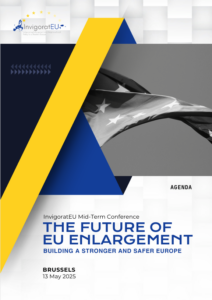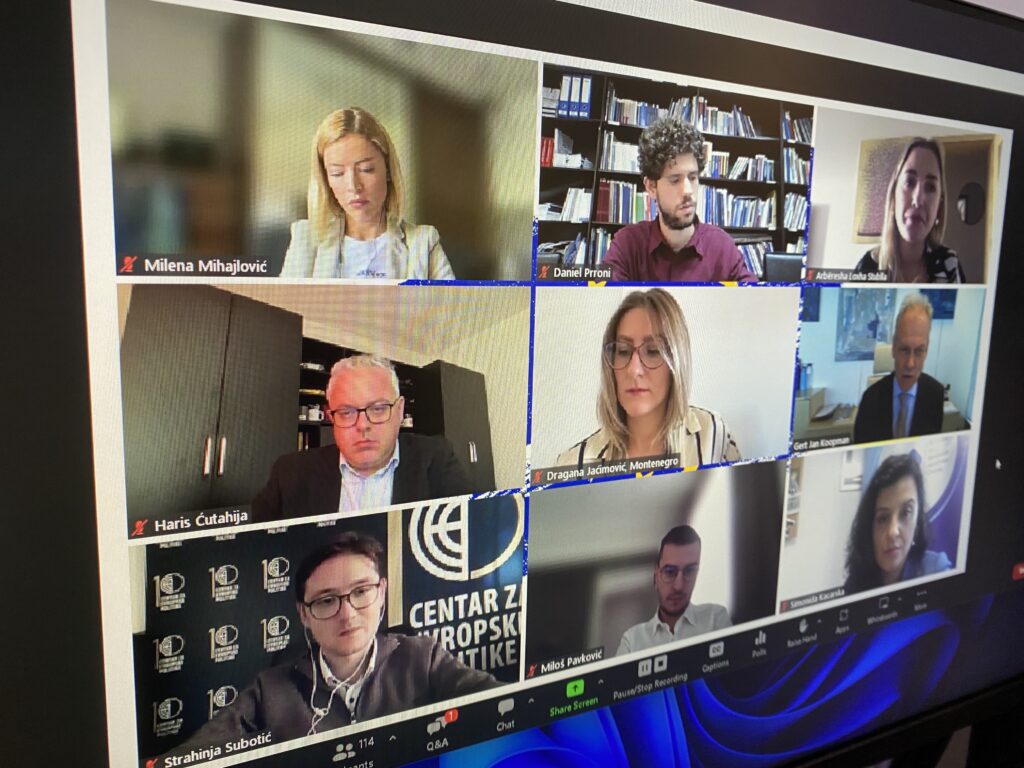Headquarters: Svetog Nauma 7, 11000
Office address: Đorđa Vajferta 13, 11000
Phone:: +381 11 4529 323

10 November 2023 – Yesterday, the webinar was held in the European Policy Centre (CEP Belgrade) organisation, titled Discussing the 2023 Enlargement Package and the Functioning of Democratic Institutions in the Western Balkans. This webinar gathered experts and members of Think for Europe Network (TEN) along with Gert Jan Koopman, Director–General for EU Neighbourhood Policy & Enlargement Negotiations (NEAR), European Commission, and Luca Gori, Ambassador of Italy to Serbia. The webinar was moderated by Milena Mihajlović, Programme Director of CEP.
This webinar had two aims. The first one was to present the findings of 2022/23 research of the Commission’s methodology of assessing one of the Fundamental’s sub-areas, such as the Functioning of Democratic Institutions across the region, with the support of the Ministry of Foreign Affairs and International Cooperation of Italy. The second one was to delve deeper into the EU’s 2023 Enlargement Package and the current state of democratic institutions in the Western Balkans.

The webinar began with an address from Luca Gori, Ambassador of Italy to Serbia, who gave introductory remarks and made a historical review of European integration. In his opening remarks, he emphasised three conditions which are necessary for enlargement to happen: the first one is to have enlargement high on the agenda in Brussels, and the second is that there is the right balance between conditionality and incentives to make national administrations to keep up with the process. The third one is to have countries in the region ready to invest political capital and ready for timely reforms.
In the second part of the introduction, Mr. Koopman said there is a window of opportunity for enlargement for the Western Balkans.
There has been progress, but more progress could have been achieved. We are not satisfied, and we are ready to take our part in the responsibility.
After the address of Mr Gori and the Director-General for NEAR, the webinar proceeded with a discussion about the Enlargement Package and the six-country reports with experts from TEN, where experts for each country presented the current state of play of reform processes and accession prospects of the WB.
The discussion started with Haris Cutahija from the Foreign Policy Initiative (FPI BH), who commented on the Report for BiH and used the opportunity to highlight the importance of opening the negotiations with Bosnia to unstuck its status.
I want to stress the opening of the negotiations with BIH. If we stay in this stage, we will be here for years. It’s important to understand that BIH cannot solve all our problems simultaneously, but to start solving them; we need to open negotiations.
Moving to Tirana, Daniel Prroni from the Institute for Democracy and Mediation (IDM) noted that the Report says that Albania is constantly aligned with the EU’s foreign policy. Also, he said that the speed of implementing the agreements could be improved, and three agreements signed at the summits before having yet to be ratified. However, Albania had good headlines in the international community, which came as a cost at home.
Next in line was Montenegro, and Dragana Jaćimović from Institute Alternativa used the opportunity to comment on the Report for Montenegro and point out that there was no backsliding and no breakthrough.
“There has been no progress in judicial reforms and only some progress in the fight against organised crime. “
Simonida Kacarska from the European Policy Institute (EPI) in North Macedonia said that after a decade of constant analysis on a horizontal level, a few things were spotted.
North Macedonia has encountered stagnation regarding preparedness to take obligations to implement the acquis. We have been fully aligned with the CFSP so far. This year, we had good progress in three of the 35 chapters. What worries us is the need for more progress when we speak about the judiciary and the fight against corruption, including political polarisation, which affects the institutions.
Strahinja Subotić, Programme Manager and Senior Researcher at CEP talked in his speech about insight when it comes to Serbia.
The Commission findings on the lack of meaningful progress warn that Serbia is turning into something that I would call a limbo state’ – a state with the inability to break free from the status quo. With its’ millimetre-size’ progress, 2030 perspective will remain out of reach.
After that thought–provoking discussion, Miloš Pavković, Researcher at CEP, presented CEP’s research project on the Functioning of democratic institutions (FoDI) and what they identified as inconsistencies in the 2022 European Commission’s Annual reports for Western Balkan countries.
Concluding the whole webinar with the questions and answers sessions from the participants, moderator of the webinar Milena Mihajlović closed the session on a positive note, hoping that we will have reason to meet again and discuss more substantive progress.